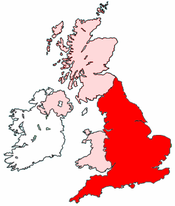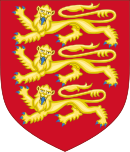English independence: Difference between revisions
M.Jovellanos (talk | contribs) →Arguments for English independence: fix some minos changes in spelling, and add Imperial College |
M.Jovellanos (talk | contribs) →Arguments for English independence: fix the links of oxford and cambridge (they previously linked to the cities - my bad) |
||
| Line 15: | Line 15: | ||
==Arguments for English independence== |
==Arguments for English independence== |
||
Advocates of English sovereignty state that a sovereign England would possess one of the world's largest [[Gross Domestic Product]]s, have [[London]] (as arguably the major [[Global city|world city]]) as its [[capital city|capital]], possess world class educational instiutions that are among the world's most prestigious universities (such as [[Oxford]], [[Cambridge]], [[London School of Economics|LSE]], [[Imperial College]], [[University College London|UCL]], etc.), be among the world's most visited countries (in terms of tourist numbers), and thus still be a country of some influence in the world. |
Advocates of English sovereignty state that a sovereign England would possess one of the world's largest [[Gross Domestic Product]]s, have [[London]] (as arguably the major [[Global city|world city]]) as its [[capital city|capital]], possess world class educational instiutions that are among the world's most prestigious universities (such as [[University of Oxford|Oxford]], [[University of Cambridge|Cambridge]], [[London School of Economics|LSE]], [[Imperial College]], [[University College London|UCL]], etc.), be among the world's most visited countries (in terms of tourist numbers), and thus still be a country of some influence in the world. |
||
==Arguments against English independence== |
==Arguments against English independence== |
||
Revision as of 14:52, 25 May 2010


English independence is a political ideal advocated by some English people that England, the largest and most populous country within the United Kingdom, should secede from the UK and become an independent sovereign state. Levels of interest in English independence have risen in recent decades as a direct result of devolution in Scotland and Wales, where Scottish independence and Welsh independence are campaigned for by important regional political parties in the Scottish National Party and Plaid Cymru.[1] English independence is seen as a way to resolve the West Lothian question in British politics, whereby Scottish and Welsh MPs in the House of Commons of Parliament can decide on English matters, while English MPs do not necessarily have the same power over equivalent issues in Scotland or Wales, as they may be devolved to the Scottish Parliament or National Assembly for Wales.[2][3][4]
While minor political parties such as the Free England Party and English Democrats Party have campaigned for a devolved English Parliament and some measure of political independence for England, all major political parties in the UK adhere to the opposing ideology of British unionism, which stresses the unity of the United Kingdom, and oppose altering the constitutional status of England.[5] Scottish demands for independence, rather than English demands, are generally seen as the most pressing threat to British unity.[6]
History
| This article is part of a series within the Politics of the United Kingdom on the |
 |
|---|
The development of an English national identity took place over a long period of time, with the creation of the Kingdom of England taking place in the tenth century. The Kingdom of England spanned the southern two-thirds of Great Britain and a number of smaller outlying islands, comprising what is now the modern-day legal entity of England and Wales. The Norman conquest of Wales from 1067-1283 (formalized with the Statute of Rhuddlan in 1284) placed Wales under English control, and Wales came under English law with the Laws in Wales Acts 1535–1542, which disestablished the Principality of Wales.
In 1603, the Union of the Crowns took place when the death of Elizabeth I resulted in James VI, King of Scots, acceding to the Engline throne, placing England and Scotland under personal union. In 1707, the Acts of Union were passed by both the Parliament of England and Parliament of Scotland, forming the Kingdom of Great Britain. At the time of the union of the parliaments, the measure was deeply unpopular in both Scotland and England. The Scottish signatories to the treaty were forced to sign the documents in secrecy because of mass rioting and unrest in the Scottish capital, Edinburgh. Scotland did however retain Scots law, a distinct legal system from that used in England and Wales.
In 1800, the Kingdom of Great Britain and the Kingdom of Ireland both passed new Acts of Union, creating the United Kingdom of Great Britain and Ireland. In 1921, the Anglo-Irish Treaty was agreed, allowing Southern Ireland under the Irish Free State to become a Dominion, resulting in only Nothern Ireland remaining within the UK, which in 1927 was formally renamed the United Kingdom of Great Britain and Northern Ireland.
Arguments for English independence
Advocates of English sovereignty state that a sovereign England would possess one of the world's largest Gross Domestic Products, have London (as arguably the major world city) as its capital, possess world class educational instiutions that are among the world's most prestigious universities (such as Oxford, Cambridge, LSE, Imperial College, UCL, etc.), be among the world's most visited countries (in terms of tourist numbers), and thus still be a country of some influence in the world.
Arguments against English independence
Those who oppose English independence and endorse the continuation of a form of Union believe that being part of the United Kingdom is in the English national interest, whereas supporters of English independence claim that the loss of independently English representation, both at national and international level, is detrimental to English interests, and that as the British government acts primarily in the interest of the entire United Kingdom, they claim it can be, in specific instances, to the inadvertent or perceived detriment of specifically English interests.
Opinion polls
The English nationalist movement has its roots in a perception amongst many people in England that they are primarily or exclusively English rather than British. The perceived rise in English identity in recent years, as evidenced by the increased display of the English flag (particularly during international sporting competitions), is sometimes attributed in the media to the increased devolution of political power to Scotland, Wales and Northern Ireland. One possible incentive for supporting the establishment of self-governing English political institutions is the West Lothian question: the constitutional inconsistency whereby MPs from all four nations of the UK, can vote on matters that solely affect England, while those same matters are reserved to the devolved assembly of the other nations. (For example the Scottish MP for West Lothian does not have a say in policing in West Lothian, but does have a say on policing in the West Midlands.)
Contemporary English nationalist movements differ significantly from mainstream Scottish, Welsh and Cornish nationalist movements (whilst similar to some strands of Irish nationalism) insofar as they are often associated with support for right-of-centre economic and social policies. Nationalists elsewhere in the UK tend towards a social democratic political stance. English nationalism is also often associated with Euroscepticism, one reason for opposition to the EU being the belief that England is being subdivided into regions at the behest of the European Union.
A MORI opinion poll commissioned jointly by the Campaign for an English Parliament under the English Constitutional Convention Banner indicated that support for the creation of an English Parliament with the same powers as the existing Scottish Parliament had risen, with 41% of those questioned favouring such a move. In the same month an ICM Omnibus poll commissioned by the Progressive Partnership (a Scottish research organisation) showed that support for full English Independence had reached 31% of those questioned. In November 2006, another ICM poll commissioned by the Sunday Telegraph, showed that support for an English Parliament had reached 68% and support for full English Independence had reached 48% of those questioned.
Organisations
A political party campaigning for English Independence was formed in February 2008, the Free England Party, it achieving some minor electoral success before disbanding in December 2009.
References
- ^ Fraser Nelson (16 April 2008). "Alex Salmond is nudging the English towards independence without them realising it". The Spectator.
- ^ Tim Luckhurst (9 May 2010). "The English question is still unanswered". The Independent.
- ^ Alex Salmond (20 March 2007). "Only Scottish independence can solve the 'English Question'". The Telegraph.
- ^ Alex Salmond (20 March 2007). "Only Scottish independence can solve the 'English Question'". The Telegraph.
- ^ Rupa Huq (23 April 2010). "The chimera of an English parliament". The Guardian.
- ^ James Macintyre (28 March 2010). "Would the UK break up under the Conservatives?". New Stateman.
